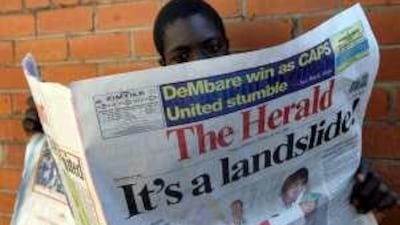BULAWAYO // As Zimbabwe inches back to normality, due in part to the six-month-old unity government's commitment to restoring press freedom, the BBC recently made an unhindered return after an eight-year ban, giving hope to analysts that the country's independent media will be revived. Since 2001, the BBC had been banned from reporting in Zimbabwe after disagreements with the Zanu-PF government of Robert Mugabe, the president, over allegedly biased coverage. Despite the ban, the network's correspondents risked arrest by sneaking into the country disguised as tourists to gather news.
The banning of the BBC and the departure of CNN at around the same time were a precursor for attacks on the independent media that saw at least four newspapers shut down. Dozens of journalists were arrested and others, made jobless by a contracting media sector, left the country. Andrew Harding, a BBC correspondent, even recently interviewed John Nkomo, chairman of Mr Mugabe's Zanu-PF party. "Things are picking up here," said Harding's largely positive story. "It's hardly boom time but this broken nation is trying."
Webster Shamu, the minister of media, information and publicity, said: "We agreed that whatever communication problems which the BBC and the officials of the Zimbabwe government may have had are in the past. "The Zimbabwe government never banned the BBC from carrying out lawful activities inside Zimbabwe. We acknowledged the need to put behind us the mutually ruinous relationship of the past." At the height of the political and economic crises last year, Harding said he secretly filmed a supermarket in Harare when it was "eerily empty".
"Today, the contrast is staggering. The shelves are packed with food - local and imported." As part of its reforms, the new government of Mr Mugabe and the prime minister Morgan Tsvangirai has repealed restrictive media laws and granted operating licences to three independent dailies, including The Daily News, a popular newspaper before authorities closed it in 2003. The Media and Information Commission, a statutory print media regulatory body whose members were appointed by Mr Mugabe and consistently denied operating licences to independent newspapers, has been reconstituted. It has been renamed the Zimbabwe Media Commission, a constitutional authority that is answerable to parliament.
The Broadcasting Authority of Zimbabwe, which regulates electronic media, has also been reconstituted, though it retains its old name. Parliament is selecting commissioners for both bodies, after which it will submit a shortlist of successful candidates to the president for appointment. Opposition parties, which rarely get coverage in the largely government-controlled sector, are happy that a diverse, independent media industry could give them a voice.
Reketayi Semwayo, the chairman of the opposition Zanu-Ndonga party, said media pluralism is a prerequisite for a thriving democracy. "We hope the government will free their [the new newspapers'] hand," Mr Semwayo said. "It is pointless to have many newspapers that are still controlled by the government or are infiltrated by its agents. We missed [the presence of independent newspapers] because opposition parties have not enough coverage. We have to solicit for it, sometimes paying journalists to have our activities covered."
Ibbo Mandaza, the former publisher of The Daily Mirror, said the ongoing media reforms put Zimbabwe on the road back to stability. "We had problems in the past few years," said Mr Mandaza, who holds a doctorate in political science. "But events from last year, that have intensified since March signal that we are going back to normal - the situation that was there before 2000." Mr Mandaza published The Daily Mirror and The Sunday Mirror from 1997 to 2007 when the papers were seized from him by a consortium of local businessman who worked for the state intelligence service. The newspapers collapsed in March 2007 because of such constraints as poor advertising support, as well as shortages and high costs of newsprint, fuel and inks.
Currently, the local media market is dominated by government-controlled titles - two dailies, four weeklies and 11 provincial titles, against just three independent weeklies. All of the country's four radio stations and one television channel are owned by the government. There are at least four independent radio stations that broadcast from exile and dozens of online news outlets, also based abroad. Two other independent weeklies are published from London.
The world is watching the progress on media reform, said the Swedish ambassador to Zimbabwe, Sten Rylander, whose country took over the rotating presidency of the European Union on July 1. "An open and vibrant media will be important in order to highlight and communicate the progress of the inclusive government as the country moves towards re-engagement," he said during a local journalistic awards ceremony in Harare July 31.
"As the Swedish presidency in Zimbabwe, we seek to follow and monitor the implementation of the [unity agreement]. The opening up of the media environment is one of the key issues that we will be observing." Mr Mandaza cautioned, however, that Zimbabwe's struggling economy could pose viability problems for any new players in the media sector. tmpofu@thenational.ae

